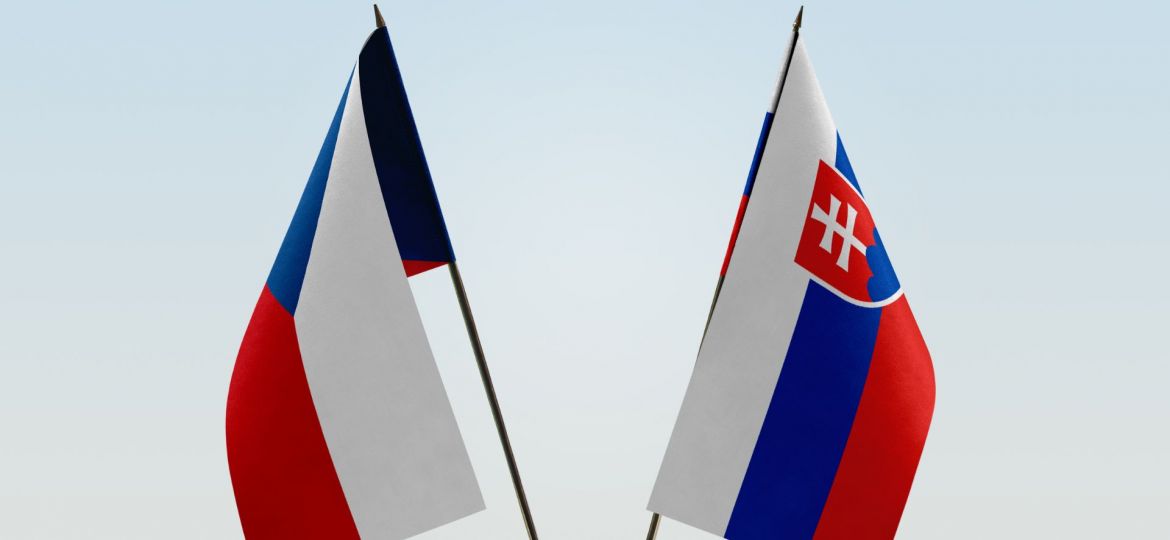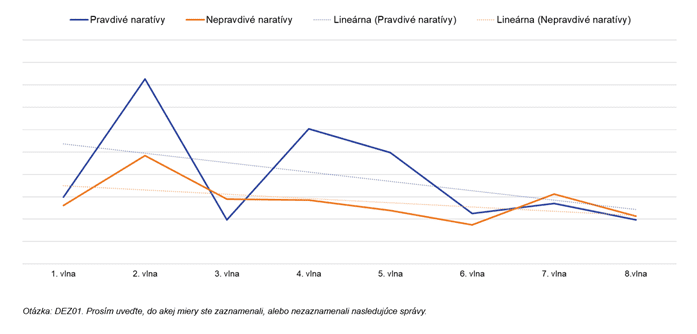
In our current quarterly brief, we have published findings that show what proportion of the population in the Czech Republic and Slovakia was affected by partial false news circulating on the internet in the first quarter of 2024. The published data also illustrates what percentage of the Czech and Slovak population is inclined to believe specific false news. While in the Czech Republic, the most widespread disinformation narrative ever reached 45% of the population, in Slovakia, the figure was disproportionately higher, at 58%. In the case of the degree of trust of respondents in individual claims, the results in the Czech Republic and Slovakia are similar; the credibility of disinformation narratives in the Czech Republic ranged from 11% to 58% and in Slovakia from 10% to 55%. In Slovakia, in March, for the first time ever in the entire measurement period (since August 2023), people reportedly encountered false news more than true news. This was the month in which the first round of the presidential elections took place.
In terms of content, the main disinformation narratives recorded in Central Europe in the first quarter of 2024 were mainly related to domestic politics and the topic of the war in Ukraine. However, narratives against the European Union and the North Atlantic Alliance were also present. The false report abusing the popular Czech hockey player Jaromir Jagr also had a significant impact.
Narratives related to domestic politics
In January, in connection with the election campaign in Slovakia, more than a quarter of Slovaks were confronted with a false report that presidential candidate Ivan Korčok held a US passport, making him a US citizen and US agent. This report was considered credible or completely credible by 25% of respondents to the CEDMO Trends survey, for which IPSOS collects data in Slovakia. A similar narrative subsequently spread in Slovakia in February. The original false claim about an American passport was expanded to include an accusation by Ivan Korčok that he had denounced his classmates as a StB collaborator before 1989 (45% reach, 36% credibility). In March, another false report about cooperation with the StB and membership in the Communist Party was spread, this time about the father of the chairman of Progressive Slovakia Michal Šimečka, the writer and publicist Milan Martin Šimečka (32% reach, 48% credibility).
Among the disinformation narratives disseminated in the Czech Republic, those aimed at domestic politics circulated to a greater extent only in March. The news that the parties of the ruling coalition are pushing for a postal vote in the Czech Parliament in order to manipulate the 2025 parliamentary elections and declare themselves the winner (38% reach, 39% credibility) had a significant impact. Also in January, 17% of respondents were hit by a false report in the information space, claiming that the mass shooting at the Faculty of Arts of Charles University on 21 December 2023 was a theatre staged to fundamentally tighten gun legislation in the Czech Republic.
Chart 1: Awareness of current narratives (Czech Republic)

N=3 000, Source: CEDMO Trends CR, march 2024 (12th wave)
Anti-Ukrainian narratives
In the Czech Republic, there were false narratives related mainly to migration, according to which Ukrainians receive more in social benefits than Czech citizens (reach 31%, credibility 41%), while at the same time identifying government aid to Ukraine and refugees as one of the main reasons for the Czech Republic’s growing national debt (reach 34%, credibility 49%). Also in January, a false claim that the murderer who killed a thirty-two-year-old man and a two-month-old girl in the Klánovice forest on the eastern outskirts of Prague in mid-December was Ukrainian appeared with a 21% reach among the population over 16.
In Slovakia, by contrast, reports on the situation in Ukraine included reports that the conflict is taking place only in the east of the country and not in Kyiv (58% reach, 37% credibility) or false reports about the planned deployment of Slovak troops to Ukraine by the EU and NATO, which Slovak Prime Minister Robert Fico is allegedly trying to prevent and therefore faces the threat of being ousted as Prime Minister (53% reach, 40% credibility). The false message that the conflict in Ukraine is only about the east of the country and not about Kyiv was the most widespread disinformation narrative in Slovakia in the quarter under review.
“Since the beginning of the CEDMO Trends survey in the Czech Republic in March 2023, anti-Ukrainian narratives have also dominated the answers to the open-ended question of which disinformation narrative has most caught the attention of a given person in the past month. However, in the last 6 months the intensity of support for the Ukrainian side of the conflict has been decreasing and by the beginning of 2024, anti-Ukrainian narratives were already appearing in the answers with approximately the same frequency as narratives communicated by the government cabinet (which people perceived as disinformation). They otherwise maintained second place in the survey for a long time,” adds Lukáš Kutil, data analyst at CEDMO Trends, adding: “The month of March, however, marked a turning point for the long-term downward trend in the perception of anti-Ukrainian narratives as disinformation. The values have returned to the level of November last year. This is the first change in a positive direction recorded since the survey began and we believe it is related to political developments in Slovakia, particularly the election of the president. The declaration of a departure from the current direction of foreign policy in Slovakia may, for the time being in the short term, cement the Czechs’ identity as pro-Western.”
Chart 2: Disinformation that interested respondents (open question)

Source: CEDMO Trends CR, September 2023 – March 2024 (Wave 6-12)
Relations between Czechs and Slovaks
A false report using the popular Czech hockey player Jaromír Jágr, among others the owner of the HC Rytíři Kladno club, tried to play on the note of tense Czech-Slovak relations. According to the report, Jaromír Jágr was forced to end his cooperation with Slovak goalkeeper Július Hudáček due to indiscriminate pressure from the media, non-profit organisations and sponsors. The report circulated with considerable reach and credibility in the public domain, especially in February, both in the Czech Republic (reach 28%, credibility 48%) and in Slovakia (reach 39%, credibility 52%).
Chart 3: Awareness of current narratives (SR)

N = 1948 , Source: CEDMO Trends SR, march 2024 (8th wave)
Narratives against the EU, NATO and WHO
Of all the disinformation narratives recorded in the first quarter of 2024, the biggest reach in the Czech Republic was information related to the EU’s Green Deal strategy, specifically electric vehicles. The message that EVs are more damaging to the environment than internal combustion engine cars and are unreliable due to frequent battery fires was believed by 58% of respondents in the Czech Republic and 55% in Slovakia. Nearly half (45%) of respondents in the Czech Republic and more than half (51%) in Slovakia had encountered this belief.
There was also a false report circulating in both countries that the World Health Organization (WHO) and the European Union had entered into a pandemic treaty that gives the WHO the power to enforce mandatory vaccination and mandatory quarantines in the event of a pandemic. In the Czech Republic, 13% of the population was affected by this information, and 24% in Slovakia. Approximately one-third of respondents (29% in the Czech Republic and 33% in Slovakia) considered the claim to be completely or somewhat credible.
The data presented in the article includes findings of selected fact-checking organizations within CEDMO (AFP, Demagog.cz, Demagog.sk and Infosecurity.sk) for the first quarter of 2024 and conclusions from three waves of the longitudinal CEDMO Trends survey in the Czech Republic and Slovakia published for the months of January, February and March 2024.
CEDMO Trends CR is a unique longitudinal panel research conducted over a period of thirty months. It offers exceptional insight into the evolution of the population’s behaviour in the consumption of different types of media content, focusing on particular types of information disorders such as misinformation and disinformation. These not only undermine public trust in the institutions necessary for the functioning of a pluralistic democracy but can also amplify individual infodemias. CEDMO (Central European Digital Media Observatory) is carrying out the survey in the Czech Republic from March 2023 in cooperation with Median on a representative sample of more than 3,000 respondents aged 16 and older.
CEDMO Trends SR runs for twenty-four months. CEDMO is conducting it in Slovakia from August 2023 in cooperation with IPSOS with financial support from Google on a representative sample of more than 1,900 respondents over 16 years of age.
